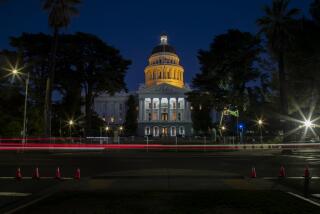Fellow Teachers React to ‘a Cruel Joke’
- Share via
The school bell had just finished ringing and students were filing into Robert Payton’s classroom in Redding, Calif., Tuesday morning when a colleague told him the news.
“My first reaction was total disbelief . . . that this was a cruel joke,” Payton recalled.
Moments later, when he realized that the space shuttle Challenger had indeed exploded, killing all seven crew members, Payton broke down in tears, surrounded by silent students.
Payton was one of the 11,146 teachers who, like Christa McAuliffe, had applied for NASA’s teacher-in-space program. And the 40-year-old science teacher at Enterprise High School was one of California’s five finalists.
In Los Angeles, Jay Schaeffer, an English teacher at Belmont High School and also a state finalist, had a different reaction. He discussed the tragedy with his students and asked them to put their feelings on paper as an assignment that is due today.
Schaeffer, 55, said he hoped the assignment would help students “channel that grief, structure it so they know how it affects them personally.”
“When you deal with young people, you have to give them some way of working out the shock and trauma,” he explained. “I stopped what I was doing (in class) and went to the blackboard. We talked about the facts, about how it affects them, how it affects the country.”
Schaeffer, who advanced further in the teacher-in-space competition than any other Los Angeles-area educator, said he was struck by the thought that he could have been in McAuliffe’s place.
“My first thought was the hubris of the gods,” he said. “In a sense, it was just a fluke that I wasn’t aboard. We were all qualified to a certain extent . . . then someone is chosen.”
Payton was so affected that he was excused from his duties for the day by the school’s principal. “There’s no way I could have presented a meaningful lesson plan today,” he said calmly, reached by phone at his home.
When he was told of the accident by another teacher, Payton turned on the classroom television, listened to the reports and began to sob. “The students gathered around,” he recalled. “Nobody said a word. They had never seen me in such a condition.”
Payton said he watched the broadcast for about 20 minutes, until the launching and explosion had been replayed. By then, other teachers had arrived to lend support. “I didn’t feel I could leave until I had actually seen the film footage of the launch itself,” he said.
Many other teachers, including California finalists Gloria McMillan of La Jolla High School and William Dillon of Peninsula High School in San Bruno, had witnessed the launching and explosion in person.
Schaeffer said he would “of course” be willing to participate in a future mission.
“I believe I would,” Payton said, “but it would be against strong protest of my wife.”
McMillan’s husband, Jim, said his wife would not be discouraged. “Of course, she does a lot of things I don’t think are safe. She hang-glides, she rides elephants in India . . . .”
Payton said he considered McAuliffe and the astronauts to be “heroes. These are people who put their lives on the line to help us understand the world and the world around us.”
More to Read
Sign up for Essential California
The most important California stories and recommendations in your inbox every morning.
You may occasionally receive promotional content from the Los Angeles Times.













